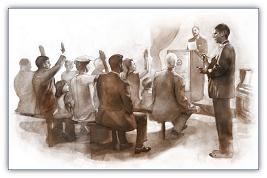The Confession of Faith Article 31 Of the Ministers, Elders, and Deacons
The Confession of Faith Article 31 Of the Ministers, Elders, and Deacons
We have already heard that the church must be governed by the spiritual policy which the Lord has taught us in His Word. Christ is the Head of the church and exercises His power by office-bearers.
Our present article speaks mainly about the election of the office-bearer – how a person comes to that office. The confession does not describe literally how this must take place, for we know from the history of the church that different methods have been used, and this is still true today. The confession states that office-bearers must be chosen, but does not prescribe how this is to be done. Again our fathers have given us a scriptural view; they were always concerned lest they go their own way, and therefore they let God's Word speak. This is also the rule for the election of office-bearers.
In Acts 20 the apostle Paul writes, "Take heed therefore unto yourselves, and to all the flock, over the which the Holy Ghost hath made you overseers, to feed the church of God, which He hath purchased with His own blood." It is clearly stated that the Holy Ghost has made them overseers, and we also read it in this article, "We believe, that the ministers of God's Word, and the elders and deacons, ought to be chosen to their respective offices by a lawful election by the Church, with calling upon the name of the Lord, and in that order which the Word of God teaches."
God's Word itself shows the way we must go in these matters. After Judas had committed suicide, the congregation was called together to choose another in his stead. Two men were set as a duo, and after calling upon the name of the Lord, one of these two was chosen. The calling upon the name of the Lord is a very important part, since His guidance cannot be missed. The election is not merely a human thing; no, the Lord has given authority to the office-bearers, and He calls them through the congregation. As shown in Scripture, the congregation received this power, not only when Matthew was called, but also when the deacons were chosen.
Office-bearers must be men of honest report, which includes their whole life – daily, social, family, spiritual and church life. It is possible that the church makes a mistake in these things, since we see only the outward appearance of man, but the Lord knows what is inside. It also happens that the same ones are always chosen; personal liking can be a reason that more fit persons are not chosen. How important is the vote which each male member casts, but then also the manner in which it is done. The election is preceded by prayer, but has it already been a matter of prayer before that? Did we also need the Lord in these matters, as to for whom we should vote?
To become an office-bearer, a lawful election is necessary. This calling to the service of the church is twofold, internal and external. Internal calling is the inner desire which the Lord gives in the heart to do this work out of love toward God in Christ to the welfare of the church. With such an internal calling the Lord inclines the heart to give ourselves unconditionally to Him; the Lord will give the ability to fulfill this task. Such persons have the qualifications or receive these gifts of the Lord. He does not promise how many talents He will give, but they will be sufficient to do the labor in His vineyard.
The external calling to the office takes place under the leading of the consistory, for which we also find a basis in God's Word: "they ordained elders in every church" (Acts 14:23). The church elected, but it took place under the leading of the apostles, who took care that everything was done orderly. This is entirely different than in the church of Rome. There the government is in the hands of the priests, more important decisions are handled by the bishops, and the pope, as the head of the church, has the last word.
The reformers returned to God's Word, and again placed the election of office-bearers in the hands of the church. Different ways were used by them to elect, but the freedom of the church was guaranteed. The three different methods used in electing church officers were the aristocratic, the democratic, and the aristocratic-democratic. It probably sounds confusing, but we will try to explain them.
In the French churches the aristocratic method was commonly used. The consistory then chose the elders and deacons, and these choices were presented to the congregation only for their approval. The democratic method, used by the Dutch refugee church in London, consisted of three steps. The members first, by a free ballot, select a list of candidates. From this list the consistory chooses those persons whom it considers most qualified. Those chosen by the consistory are then presented to the congregation for approval. The aristocratic-democratic method of the Scottish churches and the churches under the cross was that the consistory presented a list of twice the number of office-bearers needed, from which the members then chose half. The names of those elected were then presented to the congregation for approval, that is, their names were read in the congregation on the two following Sundays. If no lawful objections were brought in against them, installation would take place.
Our reformed fathers have always objected against the democratic method as being too independent. In our denominations the aristocratic-democratic method is always used. Only in exceptional circumstances, as for instance in time of war when it is not possible to call a congregational meeting, the consistory may follow the aristocratic method.
Is it also a prayer in our life that the Lord may remember us, our church with the consistories?
The consistory especially has a very responsible task, not only before the congregation, but also before the Lord. Their task is to put up candidates for the offices. They must be sure, as far as this is possible for man, that those who are nominated as candidates satisfy the conditions which are given us by God's Word. We must remember that the persons nominated can form the consistory. Perfect people are not found on earth, and also the members of the consistory are sinners, but yet that which is necessary to be known according to the Word has to be there in beginning. The apostle Paul wrote about it to Timothy, as he also had to install office bearers in the congregations. Calvin and other authors have written about it; he emphasized that unfit office-bearers are an offence to the Lord and do spiritual harm to the congregation.
Probably among the office-bearers there are some who think, "I am afraid this is written about me." In this statement we are not being personal; however, it is not – so bad when we feel ourselves as unfit. It does not give a good feeling inside, but it will drive us out to the great Office-bearer, Jesus Christ, Who has promised to give wisdom also in this when we really need it.
It is often very difficult to judge about a person, to know whether or not he is fit for office. Those who are faithful members of the church can be unfit for office. Some are not able to rule over their own families, or they are not a priest in their own family. There can also be members who are under silent censure, which is not known to the members, but only to the consistory. Therefore it is easy to understand that it would not be right for the congregation to make a free choice from all the members, but that the leading of the consistory is necessary. They in turn may ask advice of their moderator; this advice must be asked when a minister is to be called. The moderator will also sign the call letter, which represents the approval of the Classis. And, as we have said before, all such elections will be of no value if not preceded and ended with prayer.
We all know that there are differences in the offices of minister, elder and deacon, but I now want to emphasize the duration of the office. A minister has his office for life, providing he does not lose it under special circumstances. A minister may not leave his office unless there are very special and legal reasons, and these must be judged by the Classis. According to God's Word a minister remains in this service to the end of his life. This is not the same for elders and deacons. According to Article 27 of the Church Order, the elders and deacons serve only two years, and every year half of the consistory must retire from office. Voetius thought that three or four years of service would be more suitable, as two years is too short to become well acquainted with ecclesiastical matters.  In general this is not practiced in our congregations because of lack of office-bearers. When we read the explanation of the Church Order written by Rev. de Gier, several reasons are given why periodic retirement should take place. Scripture does not stipulate the term of office, and also give a possibility of change in office. It can be necessary to prevent hierarchy and to bring forward some of the gifts and abilities which are hidden in the congregation. Likewise, as Rev. de Gier mentions, incompetent officers can be removed. It can also be that family circumstances make it necessary for others to serve.
In general this is not practiced in our congregations because of lack of office-bearers. When we read the explanation of the Church Order written by Rev. de Gier, several reasons are given why periodic retirement should take place. Scripture does not stipulate the term of office, and also give a possibility of change in office. It can be necessary to prevent hierarchy and to bring forward some of the gifts and abilities which are hidden in the congregation. Likewise, as Rev. de Gier mentions, incompetent officers can be removed. It can also be that family circumstances make it necessary for others to serve.
It is self-evident that in days of war or disaster the elections may be postponed for some time. Above all, we must remember that Christ gives the office and takes it again according to His pleasure; He rules also over these things. Why is a minister chosen for life? Usually they move from one congregation to another, while elders and deacons remain in one congregation. It was for this reason that our fathers have said that in order to prevent hierarchy and ambition of power, elders and deacons should regularly resign. I must say that our fathers had good reasons for this decision; however, we also know how difficult it is to form a consistory. Many people are not available for church work, being too busy with their own business; many can not be nominated because they prefer the idols in their homes above the service of the Lord. There is also another serious reason, and it is that we find so little spiritual life in our days, which is necessary for the office. None may be unconverted according to God's Word, but the practice is so different. Where is the grace of former days? It should bring us upon our knees before the Lord, begging that He might remember us also in this respect, and that His Spirit might work powerfully among us.
Actually the consistory should have more experience than the minister, since they are to listen to the preaching whether it is sound and according to God's Word. These offices are given to the church by Christ, and we hope that the great Office-bearer may remember us in mercy. This would be to the glory of His name and to the welfare of His church.
In the first sentence of this present article our fathers emphasized the necessity that only in a lawful way may a person come to an office in the church. But now a serious warning is added, namely, "Therefore everyone must take heed, not to intrude himself by indecent means, but is bound to wait till it shall please God to call him." It is sad that our fathers had to write this, but in the practice of daily life it arises and does take place for various reasons.
It is possible to come into an office of the church in our own strength, without being called by the Lord. This is a serious offence against the Lord, Who calls His office bearers to serve His church. It can also be from ambition that we desire an office or that we think it will profit us. These are then wolves in sheep clothing, who think only of themselves and not about the honor of the Lord. They swear a false oath when they give their answer to the question as to whether they are called by the Lord. Of them Jeremiah says, "I have not sent these prophets, yet they ran; I have not spoken to them, yet they prophecy."
Another wrong way to come to an office in the church is through presents and gifts. We all know of Simon the sorcerer, who tried to buy the power of the Holy Spirit, offering money for it. From his name and action the word "simony" is derived, which means the selling of a church office. This was once common in the church of Rome, and I recently read that it still takes place today. I have no proof of it, but it is possible. I would hope that there are none among the readers of this article, whether young or old, who would walk in such paths.
On the other hand, we cannot deny that there are those who think that their life is a failure if they do not come into an office of the church. When a little something is felt of the responsibility of this office before the Lord, it would be with fear and trembling that a person accepts the call to the office. In general, it is better to hear of candidates who are afraid, than to hear of those who think they are able to do it. In the Bible we find this to be so in most instances.
But I hope that among our young readers there are those who have a true desire for the service of the Lord, and ask, "What must a person do who has a desire to such an office?" According to this article, based upon God's Word, we must wait until the Lord calls to the office. That is certain. However, I may also say to their encouragement that it is not unbiblical to have a desire for an office. Paul wrote to Timothy, "This is a true saying, if a man desire the office of a bishop, he desire a good work." Think only of Isaiah; when the Lord asked, "Whom shall I send, and who will go for us?" Isaiah answered, "Here am I; send me."
The prophet knew he was called by the Lord, and this is also mentioned in our article: "That he may have testimony of his calling, and be certain and assured that it is of the Lord." This is very important for the person in his own life to know that the Lord has called him. I remember that one of God's servants told me how important this is, especially in days of strife, so that one could plead upon it, "Lord, Thou hast called me." Many people think the office in the church is always as easy life, but this is not true. They must experience time and again the attacks of the three-headed enemy.
Here we have another point which we find in our churches, namely, that a person who feels he is called to the ministry must be able to give a testimony of it before the curatorium. The curatorium has received the authority to hear these persons on behalf of the churches; it takes place with a praying heart that the Lord might remember them in mercy. How necessary it is that throughout the whole year this be remembered in church and home! If it really becomes a matter of prayer, then the Lord could do wonders. He is the Giver of prayer, of true prayer; He cannot refuse His own work.
In the following sentences our fathers stated that all ministers have the same power and authority. It is evident that they were concerned lest hierarchy develop, which is a ruling body of clergy organized into orders or ranks, each subordinate to the one above it. It is no wonder that this is mentioned, as they had the sad experience of it in the church of Rome. There the clergy stood above the people, but also the clergy itself was divided into groups and classes. Simply stated, the priests owed responsibility to the bishops, and the bishops to the pope. This is against God's Word, for the Lord Jesus said, "One is your Master, and all ye are brethren." All ministers are the same, but age does make a difference. The greatest reward is to receive the approval of the Lord in our heart when we with His help may fulfill our duty according to His will and Word. The view of the reformers (contrary to Rome and Luther) was that as much as possible, ministers should receive the same salary and the same honor.
This parity is also in force for elders and deacons. All are called by the Lord to His service, and they labor in the same vineyard. One is called earlier than the other, but all will receive the reward of faithful servants, namely, life eternal. However, it is not the office which brings salvation, but only the grace of God.
 This article ends with the stipulation to honor office bearers because of their work in the vineyard of the Lord. We find this also stated in the form of ordination. In the course of years much has changed in this respect. In former centuries the church was hurt by too much reverence to the clergy; at times they almost received divine honor, and this brought a darkness in the church. In our days the church is also hurt, but then in an opposite way, namely, lack of appreciation. Idolatry is forbidden, also of ministers, elders and deacons; in the same way we must condemn the abuse of the church offices as it often takes place in our times.
This article ends with the stipulation to honor office bearers because of their work in the vineyard of the Lord. We find this also stated in the form of ordination. In the course of years much has changed in this respect. In former centuries the church was hurt by too much reverence to the clergy; at times they almost received divine honor, and this brought a darkness in the church. In our days the church is also hurt, but then in an opposite way, namely, lack of appreciation. Idolatry is forbidden, also of ministers, elders and deacons; in the same way we must condemn the abuse of the church offices as it often takes place in our times.
The development of this can be seen in the families. Where there is little or no respect by the parents for the offices in the church, the children go further, giving problems in catechism class and Sunday school. It is true, the office bearers are human beings with many shortcomings. However, we must remember that our fathers have written that we should honor them for the sake of their office, and this is based upon the Word of God. If this is not done, it is often regretted later; usually the children leave the truth and, humanly speaking, will be lost. The father or mother are basically the guilty one in such sad events. Often in our days we are warned against "junk-food," which undermines our health and makes us susceptible to disease; if we give our children poison, we cannot expect them to survive. Likewise, when we undermine the authority of the offices, we undermine the spiritual welfare of our children, which is a very serious trespass.
With the apostle we must say, "who is sufficient for these things?" Earthly kings usually take the best educated to be their servants. The Lord does not always do so; no, most of the time it is the opposite. He often takes of the less important ones to do great things in the kingdom of heaven. Then we will not honor the person who is used by the Lord, but will honor the Lord only, Who is the origin of all blessings. But we have also a Paul and a Moses in the history of the church, who have been of great profit.
May the Lord remember us also in the offices, sending us men in His favor.

Add new comment